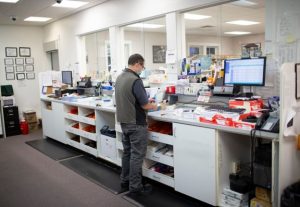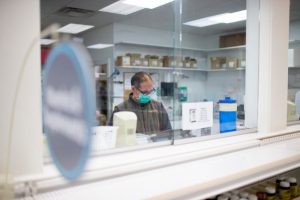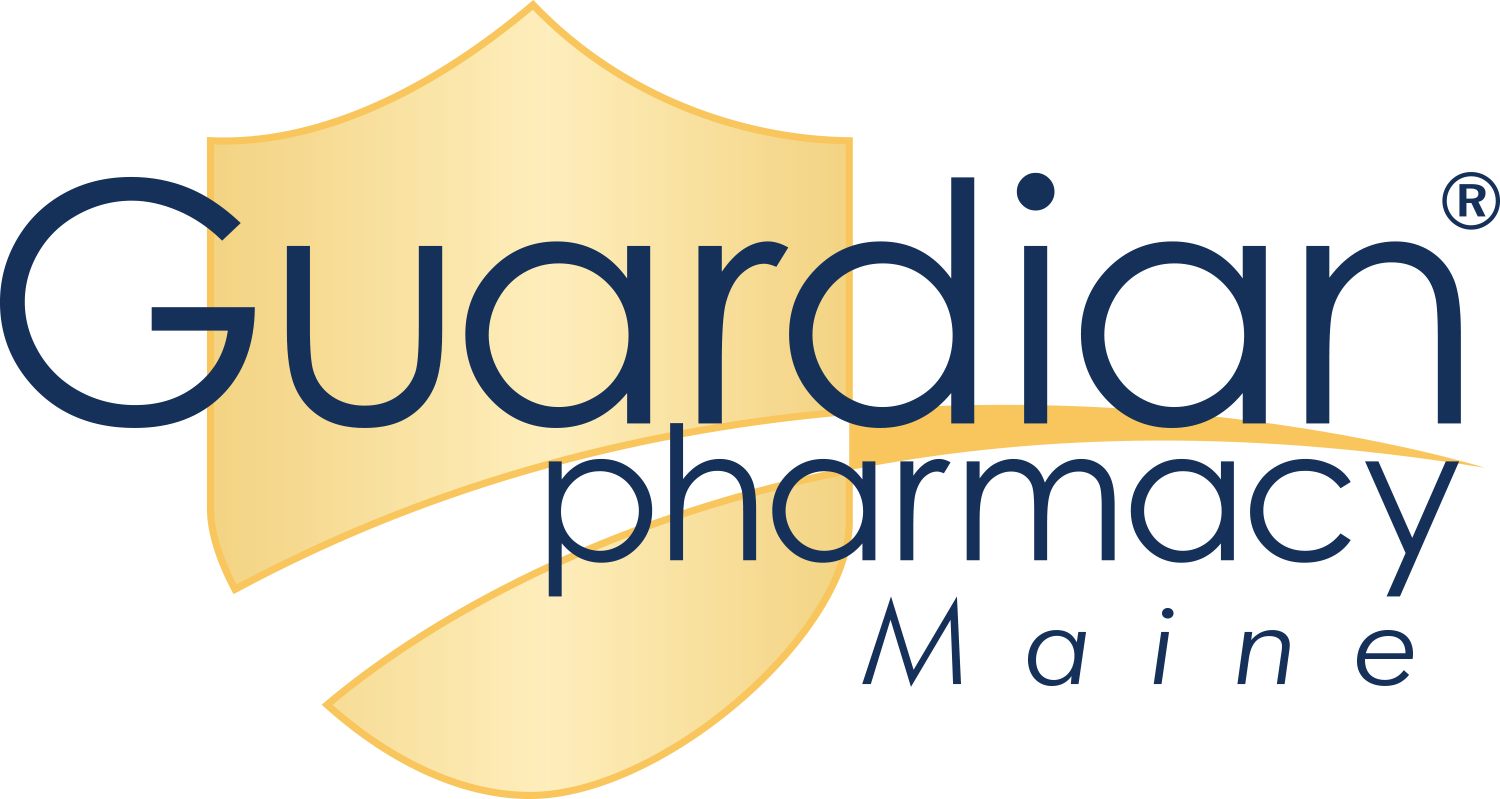The below Portland Press Herald article about Covid-19 vaccination distribution in Maine quotes Courtney Oland, president and owner of Guardian Pharmacy of Maine, about providing doses to long-term care facilities in the Brunswick area.
Click here to view the full article on the Portland Press Herald website.
As Walgreens lags in vaccinations, Maine shifts doses to independent pharmacies
For the third week in a row, the Maine CDC gave independent pharmacies thousands of doses while Walgreens and CVS, national chains with a federal contract, weren’t allocated any.
By Joe Lawlor Staff Writer

Chris Guido, a pharmacist at Community Pharmacy in Gorham, says that about 10 people per day are getting shots at the store. The pharmacy received its last shipment, of 600 doses, at the beginning of the week. Derek Davis/Staff Photographer
Walgreens has completed just 25 percent of its COVID-19 vaccination clinics at long-term care facilities in Maine, and its performance is part of what’s driving the state to shift vaccine doses from national chains to independent pharmacies as they take on a larger role in running immunization clinics.
For the third week in a row, the Maine Center for Disease Control and Prevention gave independent pharmacies thousands of doses while Walgreens and CVS were not allocated any new doses on Thursday. However, both chains continue to run immunization clinics in Maine with doses they had previously received.
Walgreens and CVS signed a contract with the U.S. Centers for Disease Control and Prevention to conduct immunization clinics at nursing homes and other long-term care facilities in 49 states, with only West Virginia opting out. But the Maine CDC has the authority to distribute the doses it receives from the federal government in a manner it believes will get shots into people’s arms most quickly.
The agency has done so by moving doses around and not allocating doses to Walgreens or CVS for the past three weeks, while giving more doses to independent pharmacies.
While Walgreens had run all of its 40 nursing home clinics by Jan. 25 – the latest data that was available on its website – it had completed just 16 percent of the 189 other long-term care facility clinics it had been designated to administer. On Thursday night, a spokesman for Walgreens said that the percentage had increased to 25 percent through Jan. 26.
In most states, Walgreens has completed at least 50 percent of vaccinations at its long-term care clinics, and in 18 states it has finished more than 70 percent of its clinics. In only two states was the percentage of completed clinics at long-term care facilities lower than in Maine, with Wisconsin at 10 percent and Maryland at 9 percent, according to data Walgreens released on its website.
Campbell O’Connor, a Walgreens spokesman, refused requests for an interview and did not answer emailed questions about why the percentage of completed clinics was so low in Maine. But he said in an email response to questions that the clinics would be ramping up, with 55 clinics scheduled over the next week.
“We will complete first-dose vaccinations in assisted-living and other long-term care facilities that selected Walgreens as their vaccine provider by mid-February,” O’Connor said in an email response to questions.
CVS has performed much better, having completed all of the 38 nursing homes and 90 percent of the 170 long-term facilities on its list of clinics. Walgreens operates 79 stores in Maine, while CVS has 25 locations, according to their websites.

Chris Guido works Thursday at Community Pharmacy in Gorham. Amelia Arnold, pharmacy operations manager for Community Pharmacy, which has nine locations in Maine, said one key to an efficient vaccine program is matching orders with what the pharmacies can realistically administer in one week. Derek Davis/Staff Photographer
Dr. Nirav Shah, director of the Maine CDC, said in an interview with the Press Herald this week that while Walgreens was conducting its vaccination clinics too slowly early on, the drugstore chain has performed much better during the past few weeks.
Shah said one of the logistical problems with Walgreens was a mismatch in doses, explaining that Walgreens would take more doses than needed to a clinic. The doses weren’t wasted, but that meant they were sitting on the shelf for longer. He said a few weeks ago, he asked Walgreens some “hard questions” – including why they weren’t scheduling vaccination clinics fast enough – and they have since improved their performance.
“Is the program moving as fast as anyone would have wanted it to? No. But I asked them to do better and they did,” Shah said.
This month, the Maine CDC has moved a total of 2,925 doses originally designated for Walgreens to independent pharmacies and two Lewiston hospitals – Central Maine Medical Center and St. Mary’s Medical Center. Shah said overall, CVS has done a better job than Walgreens.
He said the independent pharmacies are a bright spot, and the state has given more vaccine in recent weeks to those pharmacies to run clinics at long-term care facilities. These facilities include congregate care centers, such as assisted-living centers for seniors who do not need nursing home-level care, hospice centers and group homes for adults with intellectual or developmental disabilities.
“The independent pharmacies are doing an exceptional job. I have nothing but kudos for them,” Shah said. “The independent pharmacies never dropped the ball.”
In the first two weeks of Maine’s vaccination program, all 10,525 doses slated for pharmacies went to CVS and Walgreens. But since early January, the role of the independent pharmacies has grown, from 1,200 doses in the third week of the program to 2,900 doses in the seventh week and 2,800 doses for next week, the eighth week since vaccinations began. CVS and Walgreens have received a total of 27,100 doses – although none for the past three weeks – while independent pharmacies have received a total of 13,600 doses.
The state says it hasn’t given doses to the two major chains in three weeks because they have enough on hand.
Amelia Arnold, pharmacy operations manager at Community Pharmacy, which has nine locations in the state, said one of the keys to having an efficient vaccine program is to match the orders with what the pharmacies can realistically accomplish in one week. The vaccine doses arrive on Mondays, usually a few hundred per week but a total of 900 this week. Community Pharmacy runs the clinics Tuesdays through Fridays to use up all the doses it receives from the Maine CDC that week.
“We work hard to only order the vaccines that we need,” Arnold said. “The last thing we want to do is to have unused doses in the freezer.”
Arnold said Community Pharmacy has increased its orders, but has made sure to ramp up its operations in a way that’s sustainable, with enough staff to run the clinics efficiently.
Courtney Oland, president and owner of Guardian Pharmacy in Brunswick, said joining the Maine CDC’s immunization program was a natural fit for them because Guardian Pharmacy already serves people in long-term care. Guardian Pharmacy did a drive-thru clinic for adults with intellectual disabilities this week in Brunswick, and has been conducting clinics throughout the state since late December, she said. Guardian Pharmacy received 800 doses from the Maine CDC this week.
The independent pharmacies have personal connections with the long-term care centers that can’t be matched by national drugstore chains, Oland said.
“We have intel in this world that the large providers don’t have. These are our customers and our people we take care of,” she said. “We felt it was our responsibility to do whatever we could to help. We put our hand up and wanted to be a part of this.”
Oland said staff members prepared by running mock clinics at Guardian in the months leading up to the start of the program. They have learned much along the way, and tweaked practices to run an efficient operation.
For instance, if they are running a clinic at an assisted-living center, they make sure the clients know to wear clothing where the sleeve can be easily moved up the arm, so that vaccinators and clients aren’t struggling with heavy clothing before getting the shot into the arm. They also put red and green cards on a table – green signifying that the vaccination line is open and red telling clients the line is closed – so people do not get in the wrong line.
Overall in Maine, the state has given 128,704 doses of the vaccine, including 97,033 first doses and 31,648 second doses.
West Virginia is one of the states that is consistently performing at the top in terms of how quickly they are getting shots into arms, and officials there have credited opting out of the CVS/Walgreens partnership. The only state to do so, West Virginia relied entirely on independent pharmacies to run clinics at nursing homes and long-term care facilities. State officials said in news reports that they have many independent pharmacies that were able to run the program, while other states have more chain drugstores.
West Virginia has the nation’s second-highest vaccination rate, behind only Alaska, according to the Bloomberg News vaccine tracker. West Virginia has given 12.03 doses per 100 people, as of Wednesday, compared to 9.02 per 100 in Maine, which has the nation’s eighth-highest rate. The national average rate is 7.8 doses per 100 people.
Shah said that while he knows many are comparing Maine and other states to see how the vaccine rollout is going, the vaccination program is still in the early stages.
“We’re running an ultra marathon, and we’ve barely finished the first mile,” he said.
Click here to view the full article on the Portland Press Herald website.







